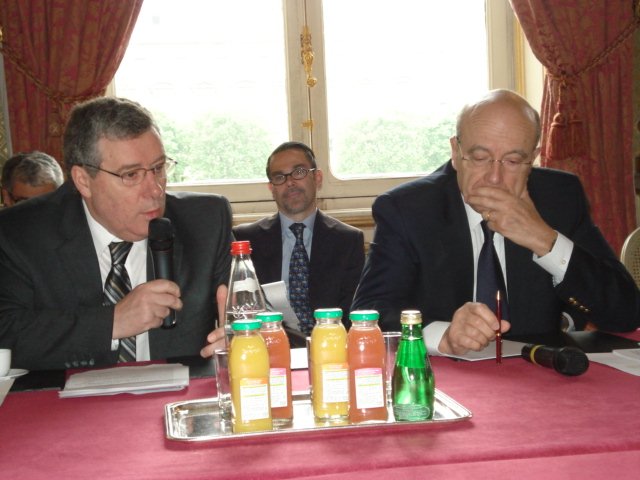“It’s been a long time since I’ve stopped believing in such a thing as ‘off’,” quipped French Foreign Minister Alain Juppe, before launching into an expansive review of foreign policy issues for 30 AAPA members last April 5 after being asked if he was “on-the-record.”
For almost two hours at the Quai d’Orsay, Juppe spoke about US-French and Franco-British relations, the crisis in Mali, elections in Senegal, the Syrian conflict, Iran, Europe’s economic and financial woes, ecology and sustainable development, European integration and even the forthcoming French elections.
Relations with Britain are “good”, Juppe remarked. “We have points where we agree and where we diverge…it is not because we have divergences that our relations are not good,” he stressed, noting that France and the U.K. are on the same wavelength in many areas – mainly on bilateral or foreign policy questions – but not necessarily on Europe.
Similarly, Juppe said that the “understanding” between President Barack Obama and President Nicolas Sarkozy is “good” and contacts are extremely frequent. He said the approach was almost the same for the US and France with regard to Syria and Iran, but there were clear differences on how to restart the stalled Middle East peace process. “We are not exactly on the same line” on how to end the impasse between Israelis and Palestinians.
On Iran, Juppe was blunt: “We have to get back to the fundamentals here.” “Iran acquiring an atomic weapon would be a catastrophe which would jeopardise not only the stability of the region, but world peace. We must agree on this principle.”
“We are doing everything to convince Iran to renounce its military nuclear programme which would, of course, bring about a riposte from other countries elsewhere who would not hesitate to start on a similar adventure.” In any event, Europe and the United States will continue their policy of “extremely strong sanctions” to keep the pressure up on Iran.
On Syria, Juppe was frank and direct: “The risk of civil war is extremely high,” given the make-up of the Syrian population and the mosaic in Syrian society.
“That is why there has not been an intervention in Syria of the same kind in Libya, with NATO,” he remarked.
“I am convinced that the regime cannot indefinitely stay in power,” Juppe affirmed.
He said the Damascus regime would have to pay for its crimes “one day or another” and he said he believed the regime was disingenuous in its promise to accept the international peace plan proposed by UN-Arab League envoy Kofi Annan.
“Can one be optimistic? I am not,” Juppe stated. “I think that Bashar Al-Assad is tricking us.”
“He is pretending to accept (Annan’s plan)…but he continues to use force faced with the benevolent indifference of the countries which support him.”
Juppe warned that ifSyriadoes not respect the time-frame for ceasing hostilities, the issue will return to the UN Security Council for further action and “all options” will be examined.
On Mali, the Foreign Minister expressed determination to support the constitutional government of that West African country and to supply logistical aid to a regional force to counter the Tuareg and Islamist insurgencies that have occupied at least half of Mali.
France will act because the situation in Mali is “extremely grave” and “the risks of contagion for neighbouring countries” in the region are such that Niger, Mauritania and even Nigeria are exposed and African leaders have indicated their “serious concern” to France.
–John Keating
